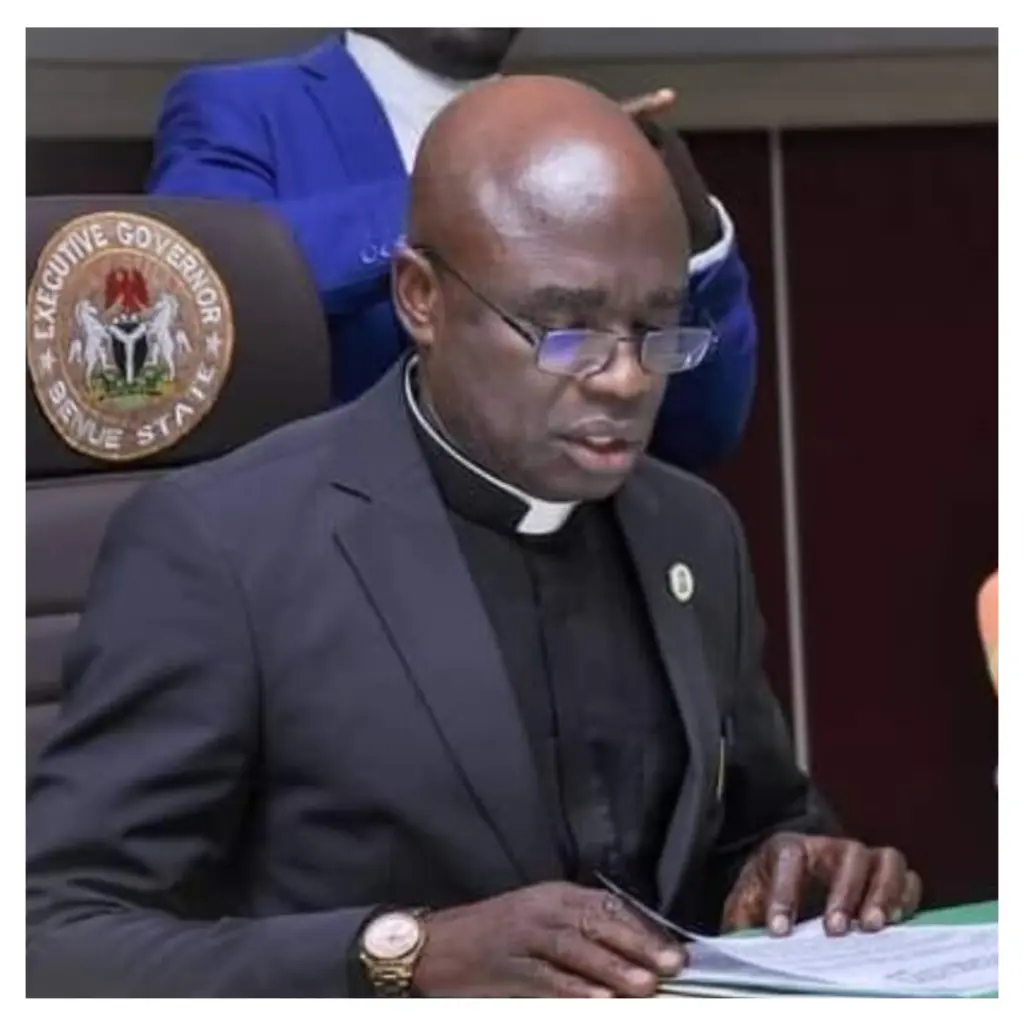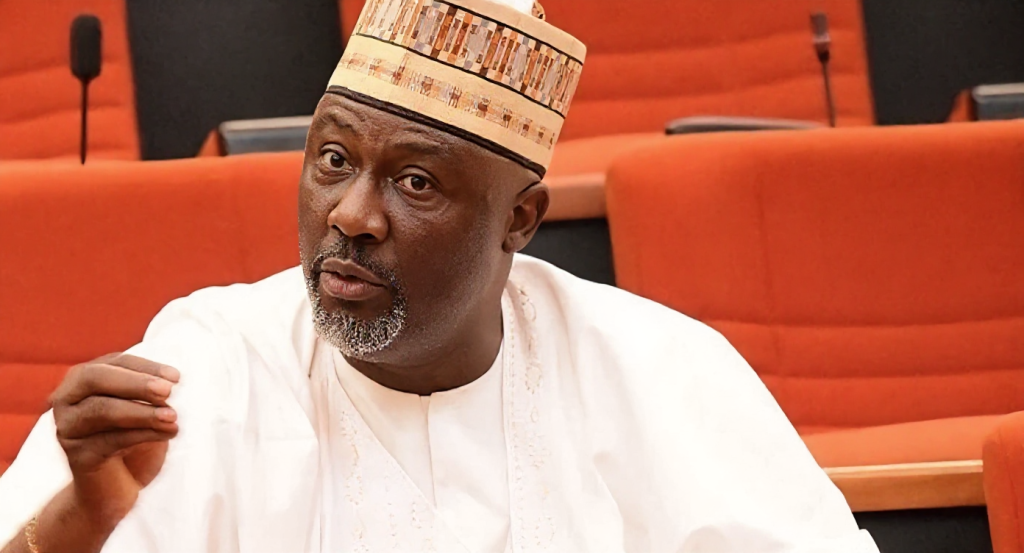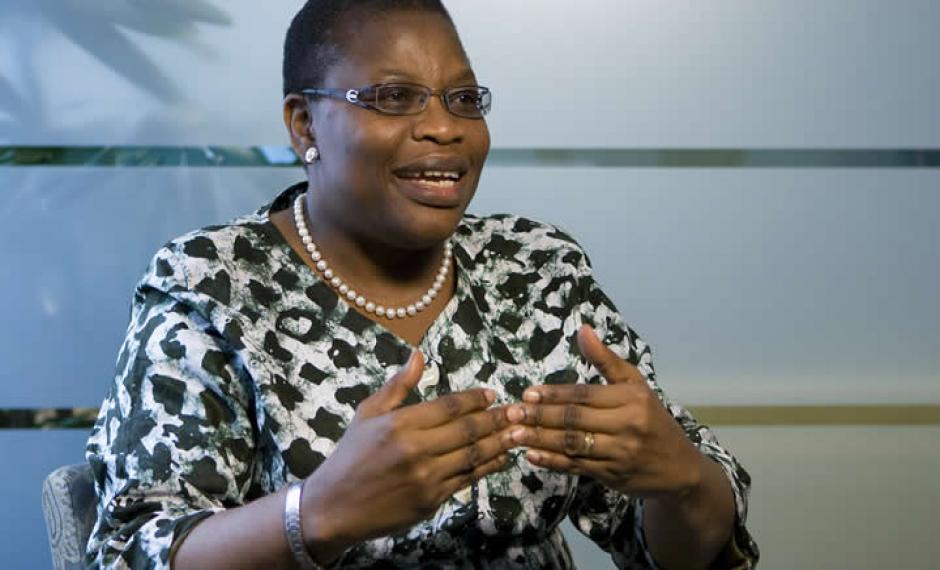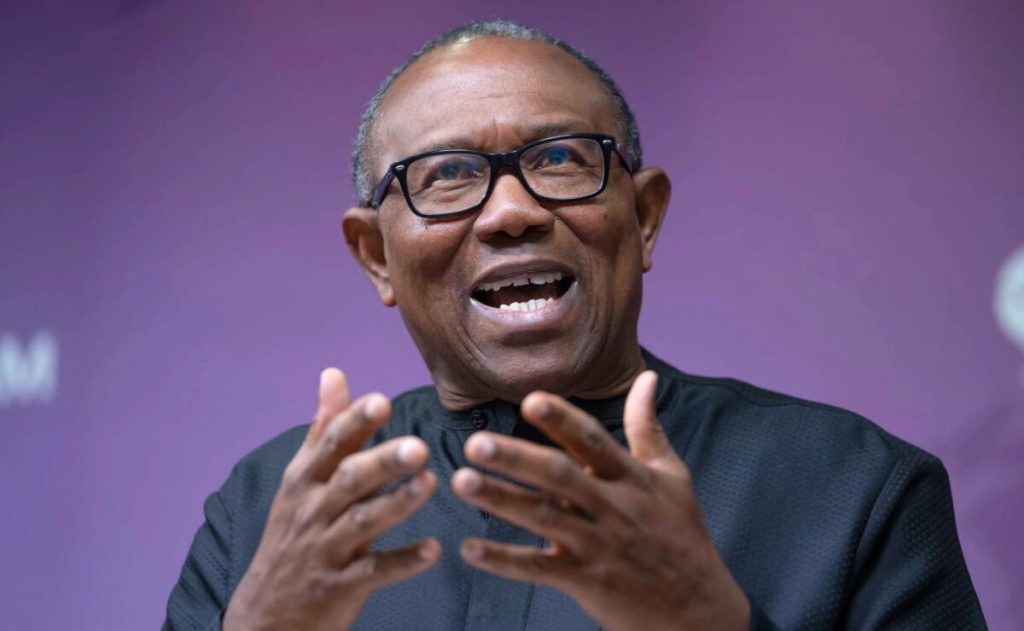Politics
Benue was bleeding, now it’s healing – Governor Alia

Benue State Governor, Hyacinth Alia, has declared that the state, once overwhelmed by insecurity and mismanagement, is now on a path to healing under his leadership.
Speaking in an exclusive interview with Vanguard, Alia reflected on his transition from Catholic priesthood to politics, his administration’s efforts in tackling insecurity, and his unique approach to fiscal discipline.
As he marks 35 years in the priesthood this July, Alia revealed that his decision to enter politics stemmed from a deep understanding of the challenges facing Benue.
“I’ve spent my life serving the people of Benue in the suburbs, understanding their struggles. It wasn’t difficult for me to transition because I was already working to fix problems as a priest,” he said.
Alia said his transition into politics was driven by an urgent desire to bring change. “As a priest, you spend your time supporting people, solving environmental and family problems. Politics was just an extension of that, although with the added responsibility of navigating a complex political environment,” he added.
On the issue of insecurity, the governor delved into the historical context, explaining that Benue’s security challenges are linked to broader regional dynamics. He noted that Benue, like other parts of Nigeria, is facing a deepening crisis caused by the ECOWAS transhumance protocol, which allowed for cross-border grazing.
“When we were growing up, there were no issues with herders. But after the ECOWAS protocol was adopted, things drastically changed,” he explained.
Alia disclosed that as of June 2024, about 500,000 people from 17 of the state’s 23 local governments were displaced due to violence.
“Our people are primarily farmers, but we’ve seen the land grab that accompanies these attacks. This is no longer pastoralism – it is a calculated destabilization,” he said.
He also emphasized that despite the challenges, his government is working to tackle displacement through a three-pronged solution: temporary shelter, integration, and relocation back to ancestral lands.
Alia urged the Federal Government to reconsider Nigeria’s participation in the ECOWAS protocol, calling for a review of the policy that has contributed to insecurity. “If the Federal Government revisits this protocol, it could make a huge difference. We need to fix our internal security first,” he said.
In addressing the state’s finances, Governor Alia revealed his commitment to fiscal transparency, pointing to the consistent payment of salaries on the 25th of each month.
“Before I came in, civil servants and pensioners went without their pay. I inherited N359 billion in debt, but we found a way to make sure workers get their pay on time,” he said, adding that he had implemented a new standard where salaries are paid even on public holidays or weekends.
Despite facing criticism from some quarters, particularly among the political elite, Alia stood firm in his belief that timely salary payments were a necessary reform. “People used to take the fish without learning to fish. Now, they’re learning to be self-reliant, and it’s creating some enemies,” he said.
The governor also reflected on his relationships with the judiciary and his political party, stressing that his administration is committed to transparency and the rule of law. “There have been no issues with the judiciary. We followed due process with the NJC, and any disputes were addressed professionally,” Alia explained.
As he looks towards the future, the governor expressed confidence that his administration’s approach to governance will continue to transform Benue. “It’s about proper planning, strategy, and execution. We’ve brought a new thinking to Benue, and the people are beginning to see the difference,” he concluded.
Politics
Electoral Reform: Dino alleges senate’s plot to rig 2027 election

Former lawmaker, Dino Melaye Esq, has raised concerns over the Senate’s reported rejection of the electronic transmission of election results.
The move, according to Melaye, is a clear endorsement of election rigging and an indication of a sinister plan to rig the 2027 elections.
In a statement on Friday, the former lawmaker criticized the Senate’s decision, stating that it undermines the credibility of the electoral process.
The African Democratic Congress, ADC chieftain, also stated that the move opens the door for electoral manipulation and fraud.
He further warned that the rejection of electronic transmission of results is a step backwards for democracy in Nigeria.
Melaye called on lawmakers and citizens to stand up against “this blatant attempt to undermine the will of the people and ensure that future elections are free, fair, and transparent”.
Politics
Electoral Act: Nigerians have every reason to be mad at Senate – Ezekwesili

Former Minister of Education, Oby Ezekwesili, has said Nigerians have every reason to be mad at the Senate over the ongoing debate on e-transmission of election results.
Ezekwesili made this known on Friday when she featured in an interview on Arise Television’s ‘Morning Show’ monitored by DAILY POST.
DAILY POST reports that the Senate on Wednesday turned down a proposed change to Clause 60, Subsection 3, of the Electoral Amendment Bill that aimed to compel the electronic transmission of election results.
Reacting to the matter, Ezekwesili said, “The fundamental issue with the review of the Electoral Act is that the Senate retained the INEC 2022 Act, Section 60 Sub 5.
“This section became infamous for the loophole it provided INEC, causing Nigerians to lose trust. Since the law established that it wasn’t mandatory for INEC to transmit electoral results in real-time, there wasn’t much anyone could say.
“Citizens embraced the opportunity to reform the INEC Act, aiming to address ambiguity and discretionary opportunities for INEC. Yet, the Senate handled it with a “let sleeping dogs lie” approach. The citizens have every reason to be as outraged as they currently are.”
Politics
Electoral act: Senate’s action confirms Nigeria ‘fantastically corrupt’, ‘disgraced’ – Peter Obi

Former Labour Party presidential candidate, Peter Obi, has condemned the Senate’s refusal to make electronic transmission of election results mandatory, saying the move further exposes Nigeria as a fantastically corrupt and disgraced country.
Obi expressed his views in a statement shared on X on Friday, where he accused lawmakers of deliberately weakening Nigeria’s democratic process ahead of the 2027 general elections.
He explained that his reaction came after a brief pause to mourn victims of a deadly tragedy in Kwara State, where over 150 people reportedly lost their lives.
“Let us first pray for the souls of the innocent Nigerians lost in Kwara. That painful incident is why I delayed responding to the shameful development surrounding our electoral system,” he wrote.
Describing the Senate’s decision as intentional and dangerous, Obi said rejecting mandatory electronic transmission was not a simple oversight but a calculated attempt to block transparency.
“The Senate’s open rejection of electronic transmission of results is an unforgivable act of electoral manipulation ahead of 2027,” he said.
According to him, the action strikes at the heart of democracy and raises serious questions about the true purpose of governance in Nigeria.
“This failure to pass a clear safeguard is a direct attack on our democracy. By refusing these transparency measures, the foundation of credible elections is being destroyed. One must ask whether government exists to ensure justice and order or to deliberately create chaos for the benefit of a few.”
The former Anambra State governor linked the post-election controversies of the 2023 general elections to the failure to fully deploy electronic transmission of results, insisting that Nigerians were misled with claims of technical failures.
“
The confusion, disputes and manipulation that followed the 2023 elections were largely due to the refusal to fully implement electronic transmission,” he said.
He added that the so-called system glitch never truly existed.
Obi compared Nigeria’s electoral process with those of other African countries that have embraced technology to improve credibility, lamenting that Nigeria continues to fall behind.
“Many African nations now use electronic transmission to strengthen their democracy. Yet Nigeria, which calls itself the giant of Africa, is moving backwards and dragging the continent along.”
He criticised Nigeria’s leadership class, saying the country’s problems persist not because of a lack of ideas but because of deliberate resistance to meaningful reform.
“We keep organising conferences and writing policy papers about Nigeria’s challenges. But the truth is that the leaders and elite are the real problem. Our refusal to change is pushing the nation backwards into a primitive system of governance.”
Warning of the dangers ahead, Obi said rejecting electronic transmission creates room for confusion and disorder that only serves the interests of a small group.
He also recalled past remarks by foreign leaders who described Nigeria as corrupt, arguing that actions like this continue to justify those statements.
“When a former UK Prime Minister described Nigeria as ‘fantastically corrupt,’ we were offended. When former US President Donald Trump called us a ‘disgraced nation,’ we were angry. But our continued resistance to transparency keeps proving them right.”
Obi warned that Nigerians should not accept a repeat of the electoral irregularities witnessed in 2023.
“Let there be no mistake. The criminality seen in 2023 must not be tolerated in 2027.”
He urged citizens to be ready to defend democracy through lawful and decisive means, while also calling on the international community to closely monitor developments in Nigeria’s electoral process.
“The international community must pay attention to the groundwork being laid for future electoral manipulation, which threatens our democracy and development,” Obi stated.
He concluded by expressing hope that change is still possible if Nigerians take collective responsibility.
“A new Nigeria is possible but only if we all rise and fight for it.”
-
Business1 year ago
US court acquits Air Peace boss, slams Mayfield $4000 fine
-

 Trending1 year ago
Trending1 year agoNYA demands release of ‘abducted’ Imo chairman, preaches good governance
-

 Politics1 year ago
Politics1 year agoMexico’s new president causes concern just weeks before the US elections
-

 Politics1 year ago
Politics1 year agoPutin invites 20 world leaders
-

 Politics1 year ago
Politics1 year agoRussia bans imports of agro-products from Kazakhstan after refusal to join BRICS
-
Entertainment1 year ago
Bobrisky falls ill in police custody, rushed to hospital
-
Entertainment1 year ago
Bobrisky transferred from Immigration to FCID, spends night behind bars
-
Education1 year ago
GOVERNOR FUBARA APPOINTS COUNCIL MEMBERS FOR KEN SARO-WIWA POLYTECHNIC BORI













